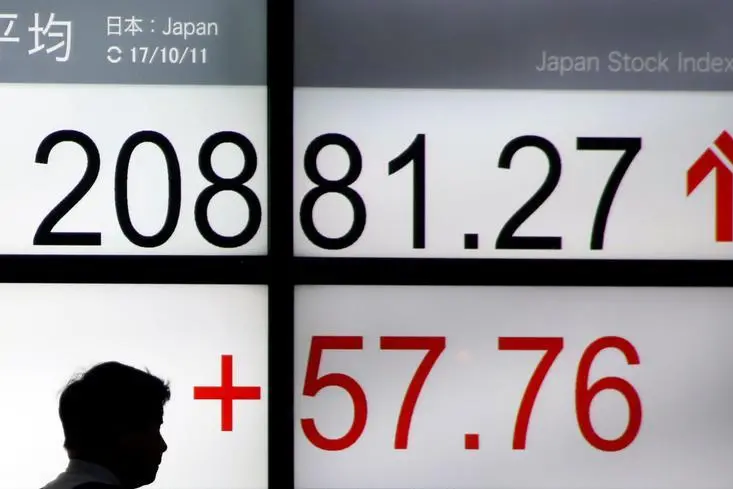PHOTO
LONDON- Another impressive record for world stocks was hanging in the balance on Thursday, as a late blow-out in Japan and falls in Europe and U.S. futures threatened to spoil the longest winning streak for MSCI's global index since 2003.
Japan's Nikkei saw a wild 2 percent swing after hitting its highest since 1992
There were a series of ECB speeches and buoyant new growth forecasts from the European Commission, though bond markets were mostly quiet following a rally this week in benchmark U.S. Treasuries and Bunds
Germany's 10-year bond yield edged up for the first time in more than a week and the euro
Oil and Middle Eastern stock and bond markets also steadied after a jittery few days caused by a purge of royals and top officials by Saudi Arabia's Crown Prince.
"The stock market has run out of a little momentum since the blow-out on the (Japanese) topix so it feels like it's temporarily paused," said Societe Generale strategist Kit Juckes.
"We are waiting for some news from the Republicans on the (U.S.) tax plans, there is a bond market that has stalled and we've got rather soggy-looking emerging markets... We probably need to get U.S. Treasury yields higher to get things going again."
MSCI's all-country equity index is clocking year-to-date gains of almost 19 percent.
But as a measure of relative calm of the current bull market and a reflection of the low volatility environment that has dominated all year, none of the most recent 10 daily gains have exceeded half a percent and more than half of them were less than 0.1 percent.
Among currencies, the New Zealand dollar was the day's big mover, surging about 1 percent to a two-week high of $0.6974 before dipping to trade at $0.6956.
The kiwi soared after the Reserve Bank of New Zealand (RBNZ) said the country's fiscal stimulus and the currency's recent fall following messy elections would lead to faster inflation and probably an earlier rise in interest rates.
On Thursday, the central bank held rates steady at 1.75 percent, as widely expected.
TAXING TIMES
The dollar index against a basket of six major currencies was 0.3 percent lower at 94.568
A U.S. Senate tax-cut bill, differing from one already in the House of Representatives, was expected to be unveiled on Thursday, complicating a Republican tax overhaul push and increasing scepticism on Wall Street about the effort.
"There's very much a risk of disappointment. The U.S. dollar could go through a weakening phase on the back of uncertainty around that tax reform," said Steven Dooley, currency strategist for Western Union Business Solutions in Melbourne.
Some also focused on fallout from Democrat wins in regional U.S. elections this week as a signal for next year's mid-term Congressional elections for President Donald Trump.
Trump himself was in China on Thursday, pressing President Xi Jinping to do more to rein in North Korea and to open the Chinese economy -- the second biggest in the world after the United States -- to more foreign firms.
The euro was shifting course, jetting back up towards $1.1650 as one of the European Central Bank's most influential policymakers acknowledged the bank's stimulus wouldn't last forever.
"Personally, I don't think quantitative easing can be a permanent instrument of ECB monetary policy simply because financial markets are not deep enough," Benoit Coeure said.
In commodity markets, Brent and U.S. crude oil futures
U.S. data showing a rise in domestic crude production had weighed on sentiment overnight but the Middle East uncertainty in Saudi Arabia limited the losses.
Gold
Palladium
The nickel market had been ignoring downside risks from policy developments in supply markets Indonesia and the Philippines, and instead focusing on potential future demand from electric vehicle batteries, said Morgan Stanley in a report.
"We (have) heard little to alter our view that producing NiSO (nickel sulphate) isn't particularly challenging/costly and we see near-term downside risk to price," it said.
Cryptocurrency Bitcoin
It had hit a record high just shy of $8,000 on Wednesday after a coalition of developers and investors suspended a software upgrade planned for next Thursday that could have split the digital currency in two.
(By Marc Jones, additional reporting by Shinichi Saoshiro; editing by Gareth Jones) ((marc.jones@thomsonreuters.com; +44)(0)(207 542 9033; Reuters Messaging: marc.jones.thomsonreuters.com@reuters.net Twitter @marcjonesrtrs))





















